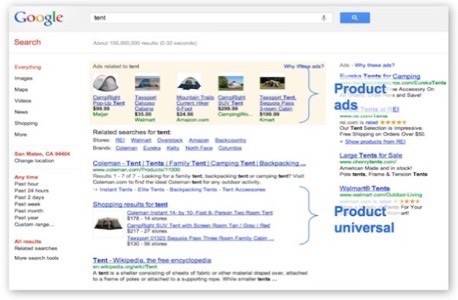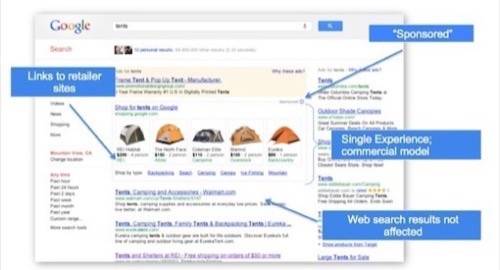Today, Google begins an experiment to change the way you shop online. When you search for a product, Google will deliver paid listings for shopping options right next to the search results. By searching for a product, you’ve demonstrated a possible intent to buy it, so Google has extended its search results page to allow participating merchants to sell it to you.
Google is not selling products the way Amazon does. Rather, it’s giving merchants who use its commercial ad model the opportunity to sell to you from the Google search results page. The ads aren’t simply text. They include images and descriptions and current prices, and they only show items that are in stock. Google’s shopping ads come with an API that lets merchants keep their listings accurate.
Google and merchants “have shared incentives to make sure this information is accurate,” says Sameer Samat, Google’s VP of product management for Google Shopping. These are ads, certainly, but they’re also search results, and Google has to provide the most informative and accurate results here or else shoppers will head straight to Amazon. “It’s about the reliability of the data. Consumer expectations have risen over the years, and this information needs to be accurate.”
So instead of a mixture of small ads along the top, text ads on the side and shopping links inside search results, a large box will present Google Shopping ads within product-related searches. Google is testing a few layouts, but basically it will either be a row of products right above the organic results or in a big box on the right side.
Sponsored listings will be clearly marked as ads, but they’ll also be much more attractive than ordinary search results. In some of the experimental designs, they’ll resemble the info boxes for the recently launched Google Knowledge Graph, except that shopping results will be marked “Sponsored.”
Old Google product results:

New Google Shopping results:

Google’s New Kind of “Paid Inclusion”
Google has long shown shopping results in Universal Search. “Universal” refers to organic Google results that are more than simple links to webpages, such as images, news stories, hotel rooms and flights. Those aren’t ads, they’re just different kinds of data than pure webpages, so Google gives them a different presentation.
But as Google has added more shopping opportunities to Universal Search, it has started to move toward paid inclusion. MarketingLand reported yesterday that this seems to violate principles Google laid out explicitly in the past. Google didn’t do so-called “paid inclusion” before. Results floated to the top of search because their reputation on the Web was the best.
But with all these new Universal sections, Google has begun to sell the opportunity to be listed. It has to keep these results up-to-date and accurate, and the only way to do it is to charge the providers as ad partners. It hasn’t compromised organic search, but it has created these big, attractive boxes – labeled “sponsored” for clarity – in which merchants can pay to play.
Merchants will now bid on the opportunity to be listed in Google Shopping results, and organic search results for other products will be less enticing. But this isn’t a clear-cut case to point and laugh at Google’s unfortunate “Don’t be evil” mantra again. Google Shopping results will provide people who are searching for products with the information needed to make a purchase, and if they’re just doing research, the organic search results will be there below.
If Google is going to make money off of searches for products, it’s not just a matter of running text ads. Google has to make search results into a storefront. If it can pull off the presentation and convince merchants to pay and participate, Google could break people of the habit of going to sites like Amazon to shop.
The experiments start on Google.com today, and merchants can participate by setting up Product Listing Ads campaigns. There will be a transition period this summer as shopping results move away from free, Universal Search results toward paid listings. Google plans to complete the transition by this fall.
Lead image courtesy of Shutterstock.










